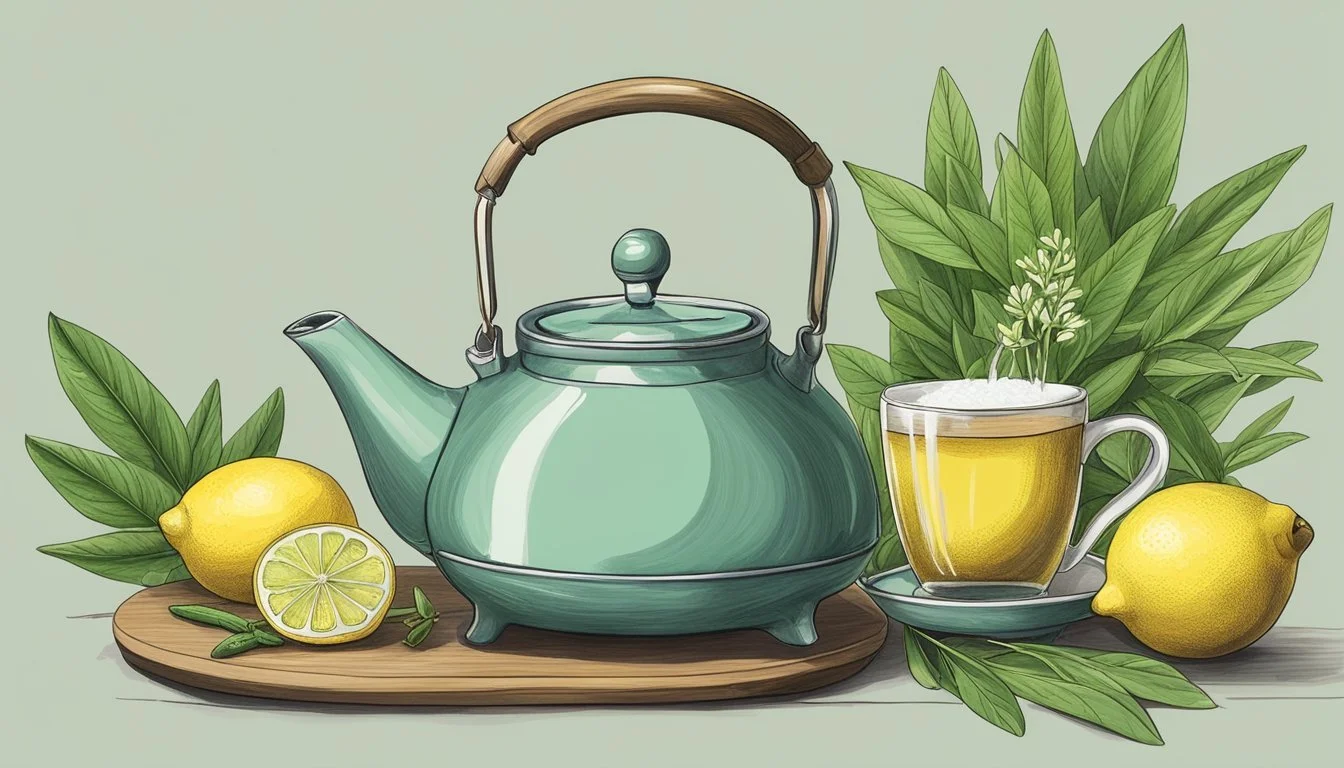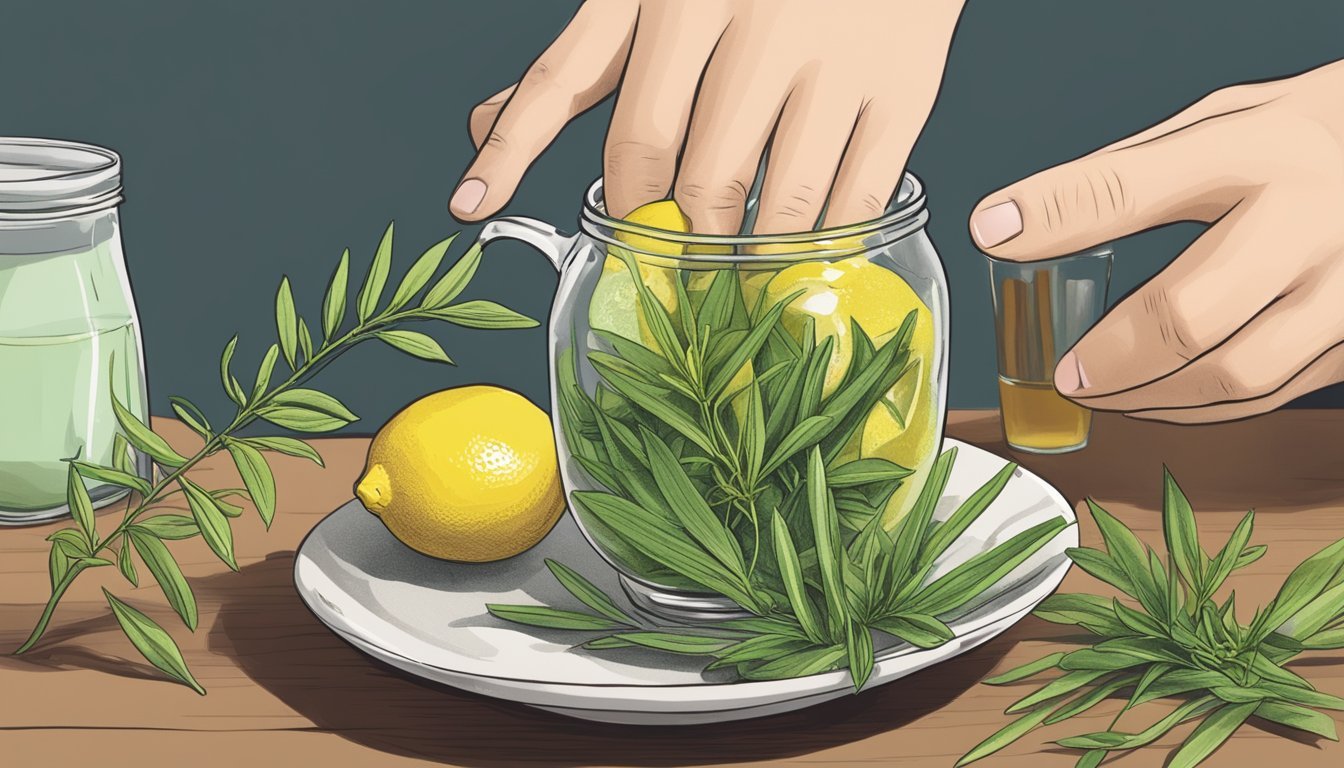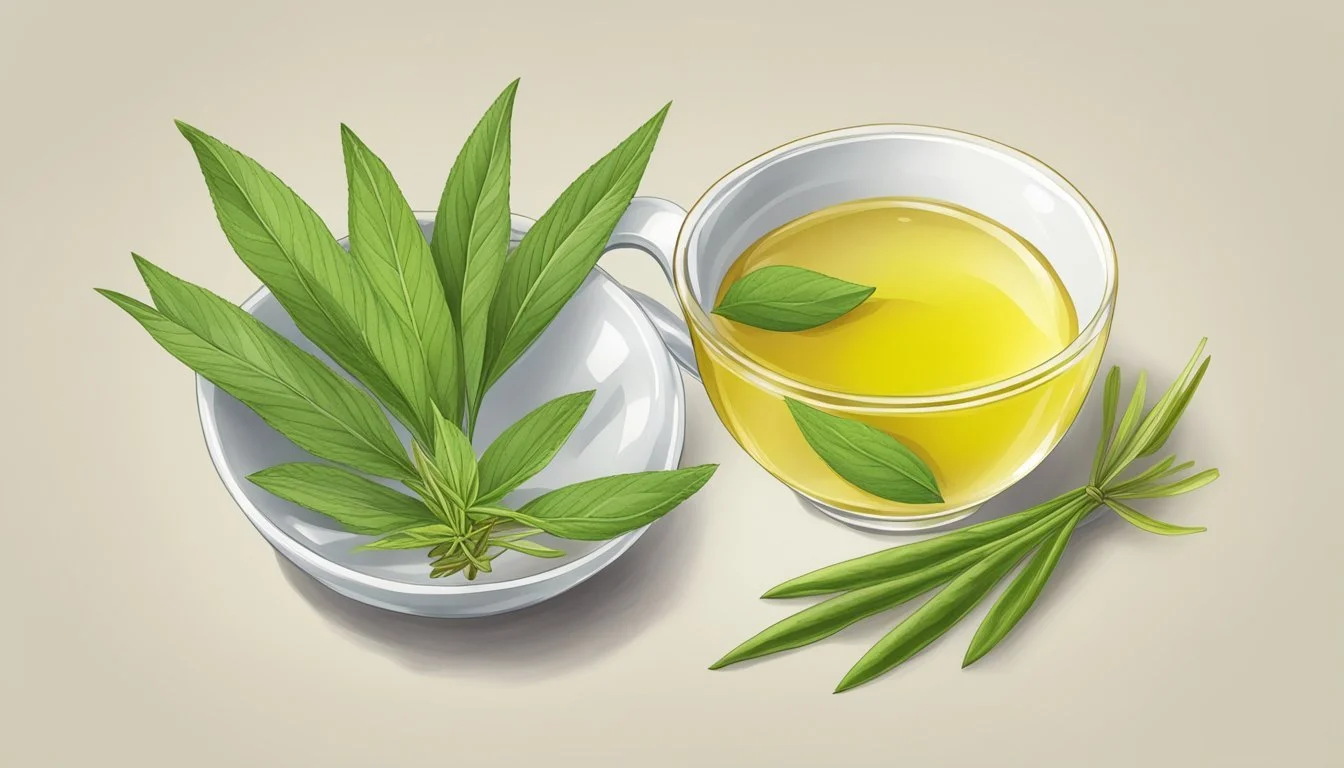How to Substitute Lemon Verbena for Lemongrass in Tea
A Simple Swap Guide
When looking for alternatives to lemongrass in tea, lemon verbena stands out as a viable substitute, bringing its own unique flavor profile. Lemon verbena possesses a strong citrus fragrance that mirrors the fresh, lemony scent of lemongrass, making it a suitable stand-in, especially in tea infusions where its robust floral notes can shine.
Incorporating lemon verbena as a substitute for lemongrass requires consideration of the intensity of flavor. Lemon verbena's leaves are potent and can infuse a tea with a pronounced lemony taste that is somewhat different from the more subtle, grassy notes of lemongrass. As a result, the quantity of lemon verbena used should be adjusted according to personal preference and the desired strength of lemon flavor in the tea.
While both herbs can enhance a beverage with their citrusy essence, it is important to note that they are not identical in taste or aroma. Nonetheless, they can be used interchangeably to a large extent in tea recipes, allowing for a refreshing and aromatic cup with distinct lemon undertones that can stand in for lemongrass when it is not available.
Understanding Lemon Verbena and Lemongrass
When substituting lemon verbena for lemongrass in tea, it's important to recognize each herb's unique characteristics in flavor and aroma. Both offer a citrus quality, but they bring distinct profiles that can influence the result of the tea.
Profile of Lemon Verbena
Lemon Verbena (Aloysia citrodora) is a leafy shrub known for its potent fragrance. It imparts a strong lemony scent enhanced by its floral notes, making it a favored herb in teas for a pronounced citrus flavor.
Flavor: Bold lemon taste with floral undertones.
Aroma: Intensely citrusy with a fragrant, floral bouquet.
Profile of Lemongrass
Lemongrass (Cymbopogon), in contrast, is a tall, stalky plant. Its aroma is lighter in comparison to lemon verbena and presents a more complex flavor profile.
Flavor: A subtle lemon taste with earthy and minty elements.
Aroma: Mildly citrus with hints of green and fresh notes.
Each herb's attributes need to be taken into account for substitution to ensure the tea maintains a harmonious balance of flavor and aroma.
The Role of Lemongrass in Tea
In tea, lemongrass imparts a distinctive citrus flavor and brings with it a range of potential health benefits. Its role extends beyond taste, contributing both to the tea's aroma and its therapeutic qualities.
Lemongrass Flavor Characteristics
Lemongrass is known for its strong, lemony scent and flavor with a slight hint of ginger. This makes it a popular choice in teas, where it can provide a refreshing and uplifting taste. Unlike lemon rind, which can be bitter, lemongrass offers a milder and sweeter citrus profile that adds depth to beverages.
Key Notes: Citrus, mild sweetness, hint of ginger.
Common Descriptors: Refreshing, uplifting, aromatic.
Comparison: Milder than lemon zest; lacks the bitterness.
Benefits of Lemongrass in Tea
Lemongrass in tea is not just about flavor; it also confers various benefits. It is thought to have digestive, antipyretic, and analgesic properties. Enjoyed in a warm cup of tea, lemongrass can help soothe a sore throat, assist in digestion, and may even help reduce stress.
Digestive aid: Can help soothe indigestion or bloating.
Soothing properties: May alleviate symptoms of cold, such as sore throat.
Antioxidants: Contains compounds that may support the immune system.
Substituting Lemon Verbena for Lemongrass
When preparing tea, lemon verbena can effectively replace lemongrass due to its strong lemon scent and flavor, though the former tends to be more floral and intense.
Flavor Compatibility
Lemon verbena exhibits a strong, fragrant lemon character that pairs well with the citrusy essence of lemongrass. The primary difference is that lemon verbena has floral notes, whereas lemongrass presents a more earthy undertone. In teas, lemon verbena may offer a higher intensity in flavor, making it suitable for recipes that embrace a pronounced lemon profile.
Recommended Ratios for Substitution
For an accurate substitution in tea recipes, consider the following guidelines:
1 stalk lemongrass = 2 to 4 leaves of lemon verbena
Modify based on personal taste preference.
Substitution in Different Types of Tea
Some specific recommendations for substituting lemon verbena in various types of tea include:
Herbal Tea: Use 2 to 4 leaves per cup of water.
Green Tea: Pair with 1 to 3 leaves to not overpower the delicate flavor of the tea.
Black Tea: Stronger tea can handle 3 to 4 leaves for a robust lemon flavor.
In making these substitutions, it's important to consider the strength of both the tea and the lemon verbena to achieve a balanced brew.
Culinary Applications Beyond Tea
While lemon verbena is a fantastic substitute for lemongrass in tea, its vibrant citrus flavor can enhance a variety of dishes. From savory mains to sweet desserts, the use of lemon verbena is diverse in the culinary world.
Lemon Verbena in Cooking
In savory dishes, lemon verbena imparts a subtle yet distinct citrusy undertone. It can be finely chopped or infused into oils to create aromatic dressings and sauces. Lemon Verbena's Applications in Savory Dishes include:
Soups and Stews: A stalk or two can be simmered to lend a lemony brightness.
Curries: Incorporate a few leaves towards the end of cooking for a fresh zest.
Marinades: Crush the leaves and mix with olive oil for a fragrant marinade.
Protip: When using lemon verbena in cooking, use it sparingly to prevent overpowering the other flavors in the dish.
Using Lemon Verbena in Desserts
The herb's sweet, floral notes make it a delightful addition to desserts. Here's how:
Infuse Creams and Syrups: Add leaves when heating to transfer the flavor for creams, custards, and dessert syrups.
Baked Goods: Incorporate finely chopped leaves into doughs and batters for a tangy twist.
Italicize to emphasize: Lemon Verbena's unique flavor works wonders in enhancing the sweetness of desserts while balancing the richness with its citrusy flavor.
Lemon Verbena in Beverages Other Than Tea
Lemon verbena can also be used in a range of other beverages, offering a refreshing twist.
Cold Infusions: Steep leaves in water for a few hours for a refreshing cold infusion.
Cocktails and Mocktails: Muddle with other ingredients to release its flavor or infuse in simple syrups.
Be mindful of the herb's potency and remember that a little goes a long way in both alcoholic and non-alcoholic beverages.
Enhancing Recipes with Citrus Notes
When substituting lemon verbena for lemongrass in tea, understanding how to incorporate and balance citrus flavors is crucial for a satisfying taste experience.
Alternative Citrus Ingredients
Substituting lemon verbena involves using ingredients that offer a similar citrus profile to lemongrass. Here are some options:
Lemon Zest: Provides intense, pure lemon flavor. Use in moderation to avoid overpowering the tea.
Lime Zest: Adds a slightly different citrus note that can complement lemon verbena well.
Lemon Juice: Offers a tart, refreshing citrus element. Start with small amounts to not dilute the tea too much.
Lime Juice: Similar to lemon juice but with a distinctively lime flavor.
Lemon Basil: Infuses the tea with mild lemon notes and an underlying basil aroma.
Lemon Thyme: Combines lemon flavor with the savory notes of thyme.
Kaffir Lime Leaves: These can be used whole or crushed to impart a unique citrus aroma, similar to lemongrass.
Balancing Citrus Flavors in Dishes
To achieve a well-rounded flavor, one should balance the citrus ingredients with other components:
Ginger: Adds a warming and spicy contrast to the citrus flavors, enhancing the tea's complexity.
Coriander: A touch of coriander can introduce a slight spice and botanical nuance.
Sugar: Sweetness is essential to counterbalance the sharpness of citrus. It helps mellow the brightness and deliver a harmonious flavor profile.
Use the following ratios as a starting guide for substitutions and adjustments:
Ingredient Substitution Ratio Lemon Verbena 1 tablespoon fresh leaves Lemon Zest ½ teaspoon per cup of tea Lime Zest ½ teaspoon per cup of tea Lemon Juice Start with ¼ teaspoon per cup of tea Lime Juice Start with ¼ teaspoon per cup of tea Lemon Basil 1 teaspoon chopped leaves per cup of tea Lemon Thyme 1 teaspoon chopped leaves per cup of tea Kaffir Lime Leaves 1 leaf per 2 cups of tea, bruised Ginger ½ inch piece, sliced or grated per cup of tea Coriander A pinch per cup of tea Sugar To taste, typically ½ teaspoon per cup of tea
Taste as you go and adjust accordingly to find the perfect balance in your tea.
Tips for Working with Lemon Verbena
Understanding how to prepare and store lemon verbena will enhance its flavor and longevity, ensuring a suitable substitute for lemongrass in tea.
Preparing Lemon Verbena
When selecting lemon verbena, one should opt for vibrant green leaves, which indicate freshness. The leaves of the lemon verbena can be used whole, but for a more intense flavor, it is advisable to bruise or chop the leaves before steeping them in hot water. This practice releases the essential oils, producing a more robust lemony flavor akin to lemongrass and can be complemented with additional ingredients like fresh ginger for a more complex profile.
Pro Tip: To mimic the pungency of dried lemongrass, one might consider incorporating a pinch of preserved lemon rind, finely chopped, into the tea blend with the lemon verbena.
Storing Lemon Verbena
Proper storage is key to maintaining the lemon verbena's aromatic qualities. For short-term storage, the fresh leaves should be wrapped lightly in a damp paper towel and placed in a plastic bag in the refrigerator. This method will keep the leaves fresh for several days.
For long-term storage:
Dried Leaves:
Dry the leaves by hanging them in a bundle or laying them flat on a screen in a dark, dry place.
Once fully dried, crumble the leaves and store them in an airtight container away from light and heat.
Freezing:
Wash and dry the leaves.
Freeze them whole on a baking sheet.
Once frozen, transfer to a freezer-safe container or bag.
Note: The flavor of lemon verbena may diminish over time, so it is best to use dried or frozen leaves within a year for optimal taste.
Common Mistakes to Avoid
When substituting lemon verbena for lemongrass in tea, achieving the desired balance of flavors without overwhelming the beverage is crucial. This section identifies common errors and provides guidance on avoiding them to preserve the delicate harmony of your tea.
Overpowering Your Dish
Lemon verbena is potent with a strong, lemony scent and flavor. Its intensity can easily overpower the nuances of a tea blend. When using lemon verbena as a substitute for lemongrass, one should be cautious not to let the robust flavor of lemon verbena dominate the subtle flavors of other ingredients in the tea. Here’s how you can avoid this mistake:
Use Sparingly: Start by adding a small number of lemon verbena leaves—consider using just half the amount of lemongrass called for and adjust to taste.
Taste As You Go: Continuous tasting during the brewing process is essential to ensure that the flavor is balanced and not overwhelming.
Substitutes to Avoid
Not all substitutes capture the unique flavor and depth that lemongrass contributes to a tea. The following are substitutes that typically do not work well in replicating the flavor of lemongrass in tea and should be avoided to prevent an undesirable taste:
Substitutes to Avoid Reason to Avoid Common Herbs (such as oregano or thyme) They have distinct flavors that differ significantly from lemongrass. Excessive Lemon Zest Though it provides a citrusy flavor, too much can introduce bitterness and overshadow the tea's complexity. Strongly Flavored Teas Teas with very bold or astringent flavors can clash with lemon verbena and alter the intended taste profile of the tea.
By being mindful of these common mistakes, one can successfully substitute lemon verbena for lemongrass to create a tea that is both pleasing and balanced.
Pairing Herbs and Spices with Lemon Verbena
When infusing lemon verbena into tea or incorporating it into cooking, one should consider the unique flavor profiles of complementary herbs and spices. Lemon verbena offers a robust citrus fragrance that pairs exceptionally well with a variety of herbs, enhancing the flavor complexity and aromatic pleasure in both tea blends and culinary dishes.
Herb Combinations for Teas
Lemon verbena serves as a delicate and fragrant base for herbal teas, imparting a zesty lemon note. To enrich the tea experience, one can combine lemon verbena with other herbs featuring complementary profiles:
Mint Leaves: Adding fresh or dried mint leaves to lemon verbena tea can introduce a refreshing and cooling undertone.
Thyme: Thyme contributes a subtle earthy layer, meshing well with the bright tones of lemon verbena.
Basil: Particularly lemon basil, with its inherent citrus notes, seamlessly merges with lemon verbena, reinforcing the lemony essence.
When choosing herbs for tea blends, it is important to balance the flavors to ensure that no single herb overwhelms the infusion.
Creating Herb Blends for Cooking
In the realm of cooking, lemon verbena's versatility allows it to be a flavorful addition to herb blends, particularly suited for light, summery dishes:
Cilantro and Coriander: These offer a slightly spicy, earthy juxtaposition to the lightness of lemon verbena, suitable for dressings and marinades.
Arugula: The peppery notes of arugula can be softened by the citrus flavor of lemon verbena, ideal for salads.
Sage and Marjoram: Pairing sage or marjoram with lemon verbena adds depth to chicken or fish recipes, where their warm, piney, and citrus hints complement white meats.
While creating herb blends, using fresh herbs can make a significant difference in imparting full, vibrant flavors to any dish.
Final Thoughts on Using Lemon Verbena as a Lemongrass Substitute
When seeking a lemongrass replacement in dishes, particularly in the realm of traditional Asian cooking, one must respect the complex flavor profile lemongrass provides. Lemon verbena offers a similar citrusy aroma, but it comes with a floral undertone that distinguishes it. In tea, this substitution captures the essence of what lemongrass would typically contribute.
In Southeast Asian cooking, where lemongrass is a staple, particularly in Thai cuisine, lemon verbena can impart the desired citrus notes to poultry and seafood dishes. (What wine goes well with seafood dishes?) Its potency is a boon in salad dressings and marinades where lemongrass’s distinct flavor is sought. Lemon verbena does not replicate the slightly more herbaceous notes of lemongrass, but as a single ingredient substitute, it is often the closest at hand.
It is worth noting the difference between lemon and lemongrass flavors; while they share a citrus base, lemongrass carries a hint of ginger and mint. In contrast, lemon verbena is often likened to other lemon accentuates such as Japanese yuzu and Italian seasoning—a testament to its versatility.
Table: Recipe Substitution Ratio
Lemongrass needed Lemon Verbena substitution 1 stalk 1-2 tsp dried or 1-2 fresh leaves
Moving beyond just making tea, cooks might explore adding bay leaf or inner leaves of leeks to introduce some of the green, slightly bitter qualities of lemongrass. Coriander stalks can sometimes serve to bridge the gap, bringing in a hint of the elusive lemongrass profile.
In summary, lemon verbena is a commendable stand-in for lemongrass in a pinch. Although there is a difference, with a confident and knowledgeable approach, one can adapt and create a tea—or any dish, for that matter—that still pays homage to the intended flavor while introducing a pleasant variation.







